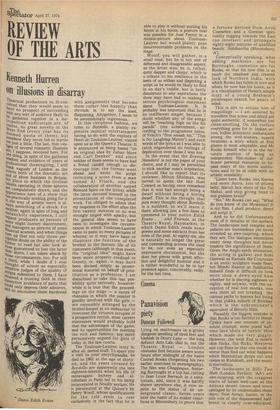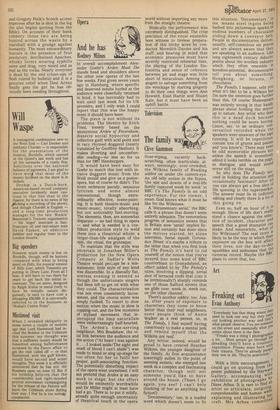Cinema
Panavision piety
Duncan Fallowell
Lying on mattresses in a grimy dungeon smelling of tired feet and hashish in Drury Lane — the long defunct Arts Lab, that is, not the Theatre Royal — London cineastes first became aware some hours after midnight of the name Conrad Rooks (forgetting his two earlier exercises in pornography). The film was Chappa qua, featuring Burroughs in a top hat cutting to Jean Louis Barrault in a sanatorium, and, since it was hardly shown anywhere else, it now aspires to the status of an underground classic. Seven years later the name of its maker resurfaces in Bloomsbury to prove that
a fortune derived from Avon Cosmetics and a German spirituality tugging towards the East can intersect and propagate eighty-eight minutes of qualified beauty, Siddhartha (Bloomsbury, 'A').
Conceptually speaking, what adding machines are for Burroughs, cosmetics are for Rooks, so that his new film is as much the idealised and created look of Northern India, with which Rooks has fallen in love and where he now has his home, as it is a visualisation of Hesse's simple story of a young Brahmin's picaresque search for peace of mind.
This is not to accuse him of maquillage — I am assured by travellers that scene and detail are quite authentic, if somewhat too clean-smelling. On the surface everything goes for it: Indian actors, Indian assistants, maharajahs among the well-wishers, superb locations, a story which at first glance is most adaptable, and Mr Rooks himself who is in the fortunate position of being an maependent film-maker of sufficient personal resources to bypass many of the movie institutions said to be at odds with an artistic sensibility.
"Listen here, Rooks, less Karma and more Sutra, lots of plump belly, biscuit box shots of the Taj Mahal, and stop giving head to this goddam kraut!"
"No," Mr Rooks can say, "What do you know of the Mysteries? It is my film, I shall produce, direct and script it."
And so he did. Unfortunately most of it remains at the surface. The landscapes and temples and palaces are tremendous yet never revealed as awe-inspring, which they are. The dialogue enunciates many deep thoughts but never imparts the significance of them. Given the Anglo-sahib intonation, the acting is gallant and Simi Garewal as Kamala the Courtesan is an erotic sculpture made flesh, but Shashi Kapoor as Siddhartha himself finds it difficult to look more than a dewy-eyed ham whether he is playing eighteen or eighty, and anyway, with the exception of real live monks, one sees them all not treading the curious paths to heaven but living in that pukka suburb of Bombay which is the subcontinent's equivalent of Beverly Hills. Plausibly the biggest mistake is that Rooks is too faithful to Hesse. Cynics have one moment of absolute triumph, some posed halftone love shots of tantric bliss which made me very giggly. However, the west End is mostly skin flicks, fist flicks, Westerns and cop films so that one could do worse than find out what happens when Manhattan drops out and comes to Rishikesh, and the music is marvellous.
The landscapes in Billy Two Hats (London Pavilion, `AA') are awe-inspring, with the craggiest tracts of Israel well-cast as the Arizona desert (more and more upstaged by its understudies these days). Desi Arnaz, Junior, in the title role of the dispossessed halfbreed, is clearly over-educated, and Gregory Peck's Scotch accent improves after he is shot in the leg (he also begins quoting from the Bible). On account of their bank robbery these two are being hunted across the waste by a marshall with a grudge against humanity. The most extraordinary feature is the presence of four predatory, detribalised Apaches, whisky lovers wearing syphilis sores and drag, very weird and as real as the rocks. Nearly everyone is dead by the end (close-ups of flesh ruined by bullets) and it is a genuine relief when Desi Arnaz finally gets the girl he has obviously been needing throughout.



































 Previous page
Previous page